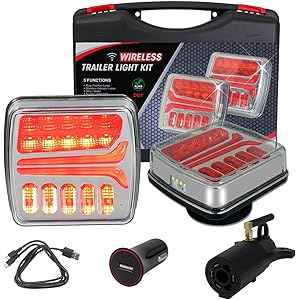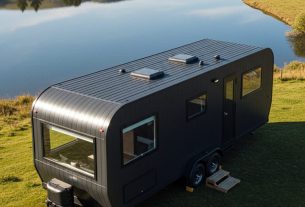When I first stumbled upon the world of mobile homes and trailer houses, I was intrigued by the various terms and classifications that people use to describe them. It’s fascinating how one type of dwelling can have multiple names, each reflecting a different facet of its identity. In this article, I aim to explore the different types of trailer houses, their unique characteristics, and why understanding these terms can be valuable. Let’s dive into this intriguing topic together!
Understanding the Terminology
Before we delve into the various types of trailer houses, it’s essential to clarify the terminology. What exactly do we mean when we refer to a trailer house? Traditionally, a trailer house is a portable dwelling that can be moved from one location to another, often referred to as a mobile home or manufactured home.
- Mobile Home: This term was widely used until the late 1970s when the U.S. Department of Housing and Urban Development (HUD) established building codes for manufactured homes.
- Manufactured Home: Post-1976, homes built in factories and transported to sites are referred to as manufactured homes, adhering to strict safety standards.
- Trailer: This term generally refers to older models of mobile homes, often lacking the modern amenities found in newer manufactured homes.
- Park Model: A smaller, often more luxurious type of manufactured home designed for temporary or seasonal use, typically found in RV parks.
Each of these terms carries its significance, and understanding them helps to appreciate the evolution of mobile living spaces. Now, let’s explore the various styles and types of trailer houses available.
Types of Trailer Houses
As I navigated through the world of trailer houses, I discovered an array of types that cater to different lifestyles, budgets, and preferences. Here’s a closer look at some of the most popular types of trailer houses:
1. Single-Wide Mobile Homes
Single-wide mobile homes are the most common type of manufactured home. Typically measuring between 600 to 1,300 square feet, they consist of a single section. These homes are ideal for individuals or small families looking for affordable housing options.
- Cost-Effective: Generally cheaper than their larger counterparts, making them accessible to many.
- Easy to Transport: Their compact size allows for easier relocation.
- Customization Options: Many manufacturers offer customizable layouts and features.
In my research, I found that the average price for a new single-wide mobile home ranges from $50,000 to $90,000, depending on various factors like location and features.
2. Double-Wide Mobile Homes
Double-wide mobile homes are essentially two single units joined together, providing more space and a traditional home feel. They typically range from 1,000 to 2,400 square feet.
- Spacious Living: With multiple bedrooms and bathrooms, they suit larger families or those desiring more room.
- Enhanced Design: Many double-wides feature open floor plans and modern amenities.
- Stability: The larger size often results in increased stability and comfort compared to single-wides.
Statistics show that double-wide homes generally cost between $70,000 and $120,000, making them a more significant but still affordable investment.
3. Triple-Wide Mobile Homes
For those seeking even more space, triple-wide mobile homes can offer three sections combined into one expansive living area. These homes can reach sizes of up to 2,500 square feet or more, featuring luxurious designs and amenities.
- Luxury Living: Often equipped with high-end appliances and finishes.
- Family-Friendly: Ideal for large families or those who frequently host guests.
- More Layout Options: Greater flexibility in customizing layouts and designs.
While these homes can be a significant investment, with prices typically ranging from $100,000 to $200,000, they offer a spacious alternative to traditional housing.
4. Tiny Homes on Wheels
The tiny house movement has gained momentum in recent years, encouraging minimalism and sustainable living. Tiny homes on wheels are compact dwellings, often measuring under 400 square feet.
- Affordability: These homes can range from $20,000 to $80,000, appealing to budget-conscious buyers.
- Mobility: Designed to be easily transported, perfect for those who love to travel.
- Eco-Friendly: Often built with sustainable materials, promoting a low-impact lifestyle.
As I explored tiny homes, I was inspired by the creativity and ingenuity that many owners demonstrated in maximizing their limited space.
5. Park Models
Park model homes are designed for temporary living, making them popular in RV parks and vacation destinations. These homes typically range from 300 to 800 square feet.
- Seasonal Living: Ideal for those who want a vacation home without the commitment of a traditional house.
- Community Amenities: Many parks offer shared facilities, enhancing the living experience.
- Affordability: Prices generally range from $30,000 to $100,000, depending on size and features.
Park models can provide a unique living experience, allowing owners to enjoy nature while still having access to modern comforts.
The Benefits of Living in a Trailer House
As I reflected on the various types of trailer houses, I couldn’t help but consider the numerous benefits that come with living in one. Here are some key advantages that stood out to me:
- Affordability: Mobile homes often come at a fraction of the cost of traditional homes, making homeownership attainable for many.
- Flexibility: The ability to relocate your home provides a unique lifestyle choice, especially for those who love to travel.
- Community: Many mobile home parks foster a sense of community, offering social opportunities and support.
- Lower Utility Costs: Many manufactured homes are energy-efficient, resulting in lower utility bills.
- Quick Construction: Unlike traditional homes, trailer houses can often be constructed and moved into within a matter of weeks.
These benefits made me realize that trailer houses can offer an attractive alternative to traditional housing, especially in today’s fast-paced world.
Challenges Faced by Trailer House Owners
While living in a trailer house has its advantages, it’s crucial to acknowledge the challenges that come with it. Here are some common issues that I discovered:
- Financing Difficulties: Securing loans for mobile homes can be more complicated than for traditional homes, often resulting in higher interest rates.
- Depreciation: Unlike traditional homes, which tend to appreciate in value, mobile homes often depreciate, affecting resale value.
- Space Limitations: Smaller living spaces can lead to challenges in storage and organization.
- Community Regulations: Many mobile home parks have strict regulations that can limit owners’ freedom to modify their homes.
- Insurance Costs: Insurance for mobile homes can sometimes be higher due to perceived risks.
Understanding these challenges is essential for anyone considering a move to a trailer house. It helps to be prepared for the potential hurdles that may arise.
Case Studies: Success Stories of Trailer House Living
To provide a broader perspective on the topic, I sought out individuals who have embraced the trailer house lifestyle. Their stories are not just inspiring; they offer valuable insights into the realities of living in mobile homes.
Case Study 1: The Smith Family
The Smith family of four made the leap to a double-wide mobile home after realizing that traditional housing was out of their budget. They shared how the affordability of their new home allowed them to invest in their children’s education and enjoy family vacations. According to them:
“Living in a mobile home has given us the financial freedom to prioritize what truly matters. We love our community, and the kids are thriving!”
Case Study 2: Emma’s Tiny Home Journey
Emma, a young professional, decided to downsize her life by moving into a tiny home on wheels. She shared her experience:
“I never thought I could live in just 200 square feet, but it’s been liberating! I spend less time cleaning and more time exploring the world.”
These case studies illustrate that, despite the challenges, many people have found happiness and fulfillment in trailer houses.
Frequently Asked Questions (FAQs)
What is the average lifespan of a trailer house?
With proper maintenance, a mobile home can last anywhere from 30 to 55 years. However, many factors, including construction quality and upkeep, can influence longevity.
Are trailer houses safe during severe weather?
While modern manufactured homes are built to withstand various weather conditions, older models may be more vulnerable. It’s essential to follow local safety guidelines and prepare for emergencies.
Can I finance a trailer house?
Yes, financing options are available, but they may differ from traditional home loans. It’s advisable to research and compare lenders to find the best rates.
Do trailer houses appreciate in value?
Generally, mobile homes depreciate over time, unlike traditional homes. However, well-maintained properties in desirable locations may retain or even increase their value.
Can I customize my trailer house?
Customization options are often available, but they may be subject to park regulations if you live in a mobile home community. Always check with your park management before making changes.
Conclusion
In conclusion, understanding what a trailer house is called and the various types available can significantly impact your housing choices. From single-wide to luxurious triple-wide homes, each type offers unique advantages tailored to different lifestyles.
While challenges exist, the benefits of affordability, flexibility, and community can make trailer house living an enriching experience. As I’ve learned from personal stories and case studies, many individuals and families have found joy and fulfillment in these homes.
If you’re considering this lifestyle or simply intrigued by the world of mobile homes, I encourage you to explore further. Share your thoughts and experiences in the comments below, and don’t forget to sign up for our newsletter for more insights on innovative living solutions. And, of course, feel free to share this article with friends and on social media!
NeaLia Magnetic Wireless Trailer Lights, Rechargeable LED Trailer Light for Towing Truck, Waterproof Tail Tow Lights Kit for RV Camper Boat Caravan, Portable Turn Signal Brake Running Stop
$65.99 (as of November 13, 2025 07:53 GMT -03:00 - More infoProduct prices and availability are accurate as of the date/time indicated and are subject to change. Any price and availability information displayed on [relevant Amazon Site(s), as applicable] at the time of purchase will apply to the purchase of this product.)
Sign up for our newsletter and stay up to date with exclusive news
that can transform your routine!





